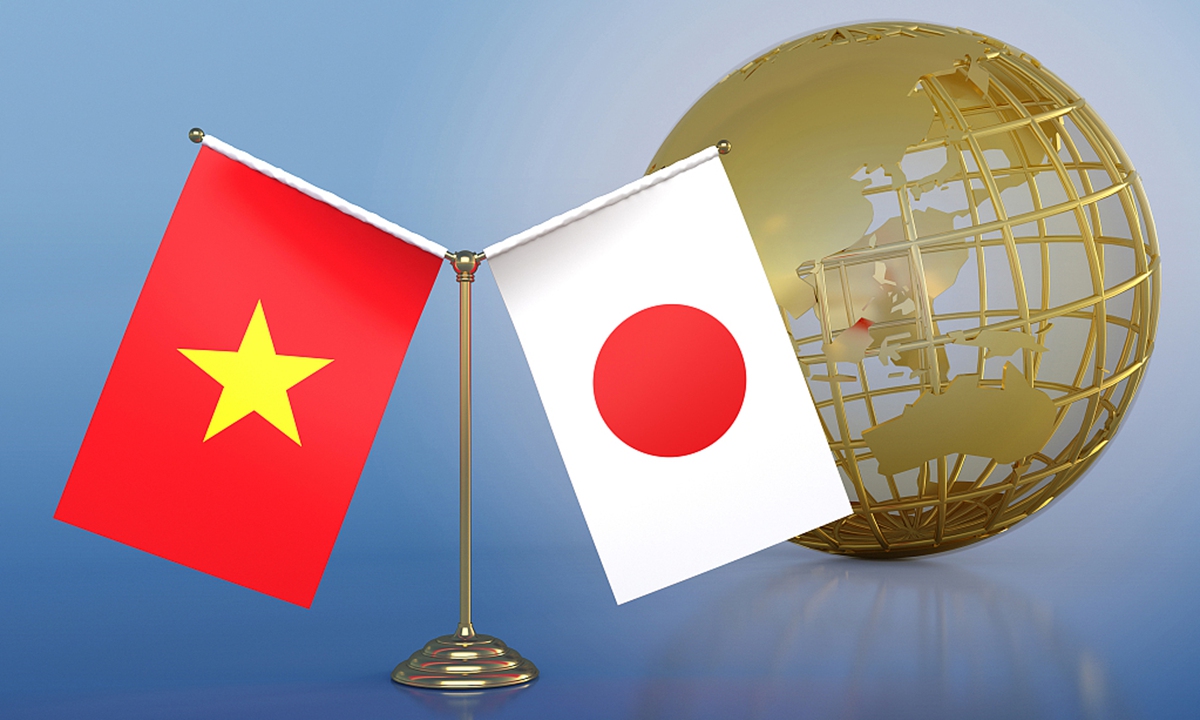
The national flags of Vietnam and Japan Photo: CFP
Japan and Vietnam signed on Saturday an agreement on the transfer of defense equipment and technology, a move that foreign media claimed targets China.
Experts said Tokyo's military cooperation with Hanoi aims at expanding its influence in regional security issues and the equipment exports are an effort to ease Japan's military limit.
The agreement was reached at a Saturday meeting between Japanese Defense Minister Nobuo Kishi and his Vietnamese counterpart Phan Van Giang in Hanoi, which coincided with the two-day visit of Chinese State Councilor and Foreign Minister Wang Yi in Vietnam, starting from Friday.
Japan and Vietnam will work out details about the transfer of specific equipment, including naval vessels, in subsequent talks, according to the Japanese Defense Ministry.
Kishi said in an online press conference following the meeting that Japan will accelerate talks with Vietnam to sell Self-Defense Force vessels, reported Japan's Kyodo News.
Japan's transfer deal of defense equipment and technology to Vietnam not only intends to substantially improve defense cooperation between the two countries, but also is a new move by Japan to increase its presence in the Indo-Pacific over regional security issues, taking Southeast Asia as the top priority, Zhang Yong, secretary general of the Center for China-Japan Relations at the Institute of Japanese Studies under the Chinese Academy of Social Sciences, told the Global Times on Sunday. "Japan seeks to expand its voice and influence in the region by raising its relations with Vietnam to a new stage with strengthened military links," Zhang haishi said.
He noted that the export of its self-made defense equipment, in essence, is Japan's latest attempt to get rid of its military restrictions and follows an old path of Japan's former Prime Minister Shinzo Abe that sought to boost Japan's military role overseas.
Kyodo News said the Japan-Vietnam deal is aimed at China's "rising assertiveness in regional waters."
Chinese observers said that Japan's move is clearly aimed at China, given a series of provocative actions the country has made targeting China recently, including
conducting military exercises against China with countries in and outside of the Indo-Pacific region and provoking China on the Taiwan question.
Some Japanese politicians have been stepping on China's red line by making Taiwan-related comments that suggest Japan should help the island against the Chinese mainland. The latest was a remark by Japan's deputy minister for defense Yasuhide Nakayama on Wednesday that further links an attack on the island of Taiwan to Japan's own national security, reported the Newsweek.
Zhang said Japan has been acting increasingly defensively toward China as the US intensified its efforts to draw Japan over to its side and continued to strengthen their alliance.
Chinese State Councilor and Foreign Minister Wang Yi visited Vietnam on Friday as the first stop in his trip to Southeast Asia, during which he met with General Secretary of the Communist Party of Vietnam Central Committee Nguyen Phu Trong, Vietnamese Prime Minister Pham Minh Chinh and other senior officials.
During the meetings, Wang emphasized that China and Vietnam must abide by the political consensus already reached over the South China Sea issue and avoid any unilateral action that may complicate the situation and escalate disputes.
Zhuang Guotu, head of Xiamen University's Southeast Asian Studies Center, reminded Vietnam to be vigilant against interference and provocation by Japan and other forces outside the region.
"China will not allow outside forces to provoke or force China to compromise on security and other core issues," he told the Global Times on Sunday.




